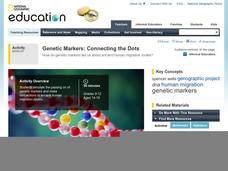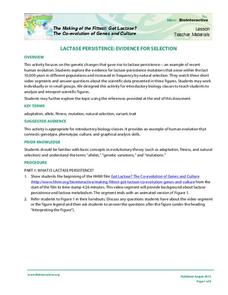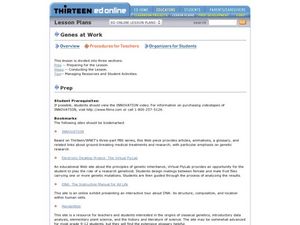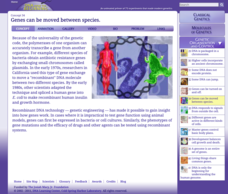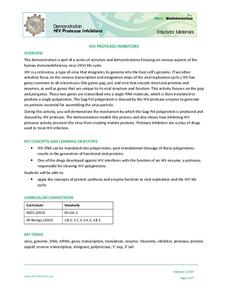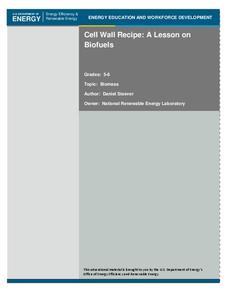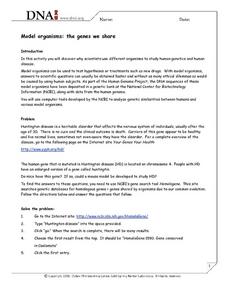Curated OER
Teaching Biology Through Bioinformatics
Wow! A very detailed slideshow covers complex topics of genome research methods. This is advanced and relevant to the highest level of school biology. Excellent resource if you wish to expose your class to scientific methods and...
Howard Hughes Medical Institute
Regulation of the Lactase Gene
All human infants are lactose tolerant, yet some adults are lactose intolerant—why is that? Individuals discover the process of gene mutation through a study of the lactase gene (LCT). They understand the geographic connections,...
Cold Spring Harbor Laboratory
Living Things Share Common Genes
Everything evolved from a common ancestor, but how did modern plants and animals develop so many more genes? Scholars use an online interactive to learn about the process. They begin to understand common genes with an animation, multiple...
Cold Spring Harbor Laboratory
DNA Is Only the Beginning for Understanding the Human Genome
Mario Capecchi requested funding for a new procedure targeting genes and was rejected. Four years later, after he proved it worked, the NIH apologized and funded his research. Use an online interactive to learn about his research and the...
Howard Hughes Medical Institute
The Molecular Evolution of Gene Birth and Death
More than 90 percent of humans' DNA doesn't code for anything! Scholars watch a presentation as they answer questions relating to gene mutations. They read details, watch videos, and view animations supporting the concepts. The questions...
Virginia Department of Education
Genetic Variation and Mutations
Young scientists demonstrate their creativity while completing several activities, to assess genetic variations and mutations. Instructors provide a list of options and scientists choose to write a comic strip, create a book,...
Howard Hughes Medical Institute
Got Lactase? The Co-Evolution of Genes and Culture
Does the human body evolve as quickly as human culture? With a stellar 15-minute video, explore the trait of lactose intolerance. Only about 1/3 of human adults seem to still have the enzyme lactase and therefore, the ability to digest...
Howard Hughes Medical Institute
How Novel Icefish Genes Can Improve Human Health
Designed to accompany the 13-minute video The Making of the Fittest: The Birth and Death of Genes, this handout serves as both a viewing guide during the video and an analysis of how the adaptations of the icefish might help treat...
Howard Hughes Medical Institute
Central Dogma and Genetic Medicine
Scientists work every day to find solutions to genetic diseases. Scholars learn about the process of gene sequencing, mutations, and the results. They explore genetic diseases and therapies to intervene and help and, through case...
Curated OER
Gene Action/Mutation Worksheet
Learners define the following terms: mutation, mutagen and give examples of how they work. They also define and illustrate a point mutation. Students define and illustrate a frame shift mutation and name two types of frame shift...
National Geographic
Genetic Markers: Connecting the Dots
Biology buffs simulate how genetic markers are passed among populations in order to understand how these markers can help anthropologists map human migration. A couple of volunteers leave the room while you walk the remaining learners...
Howard Hughes Medical Institute
Lactase Persistence: Evidence for Selection
What's the link between lactase persistence and dairy farming? Biology scholars analyze data to find evidence of the connection, then relate this to human adaptation. Working individually and in small groups, learners view short video...
Curated OER
Genes at Work
Students explore and discuss genetics stories and answer questions about genetic outcomes of offspring. In this genetics lesson, students read genetics stories on a web site. Students use a chart to answer questions regarding the...
Cold Spring Harbor Laboratory
Genes Can Be Moved Between Species
Biotechnology changes lives every day, but how did it all start? Learn about Cohen and Boyer's technique for recombinant DNA and the founding of this new scientific study. Then, scholars use the online interactive to discover how Hanahan...
Howard Hughes Medical Institute
HIV Protease Inhibitors
How do doctors fight a virus that's constantly mutating? Show science scholars how we fight HIV using one of its own most fundamental processes through a thoughtful demonstration. The lesson focuses on how protease inhibitors prevent HIV...
Cold Spring Harbor Laboratory
Some Types of Mutations Are Automatically Repaired
Does natural light damage or repair DNA? Learn the answer discover the scientists who researched the topic with an online interactive. Scholars read through an online animation presenting the content at their own pace. Then, they read...
Curated OER
Regents High School Exam: Living Environment 2008
Tne New York Regents High School Examinations are comprehensive and include various styles of questions, includingmultiple choice and the analysis of graphs. This particular version, the 2008 Living Environment exam surveys a variety of...
Curated OER
Cell Wall Recipe: A Lesson on Biofuels
Biotech engineers discover that changes in the DNA code for cell wall formation can help create crops better suited for biofuel production. They extract DNA from wheat germ. They decode paper strips with codes and relate the activity to...
Curated OER
Model Organisms: The Genes We Share
For this genetics worksheet, students access a website to learn about how human genes mutate to cause heritable disorders such as Huntington disease. Students use the information on this website to complete 12 short answer questions.
Curated OER
Gene Action and Mutation
Students review terms related to DNA structure and function. They complete a variety of worksheets in small groups or in pairs reflecting the unit's concepts regarding DNA. They submit their worksheets for grading.
Curated OER
Regents High School Examination: Living Environment 2010
This exam touches upon every topic within the typical first year biology course.. A broad variety of question styles give high schoolers every opportunity to show what they know. Why start from scratch when a comprehensive final exam is...
Curated OER
Raven Chapter 13 Guided Notes: Patterns of Inheritance
In this short space, it would be impossible to describe the breadth of this seven-page genetics worksheet. Geared toward AP or college biology learners, they explore not only the basic vocabulary and concepts, but also the Law of...
Curated OER
Regulation of Cell Division
Cell division and all the biological aspects of activation and chemical signals are detailed here. Cyclin, G phases, cell growth, and cancer checkpoint control systems are explained and the triggers listed. The slides are very clear and...
Serendip
Using Molecular and Evolutionary Biology to Understand HIV/AIDS and Treatment
HIV mutates rapidly, making treatments challenging to find. Scholars learn about why it mutates so quickly and how scientists race to find treatments. The resource approaches the issue from both a molecular and evolutionary perspective...












